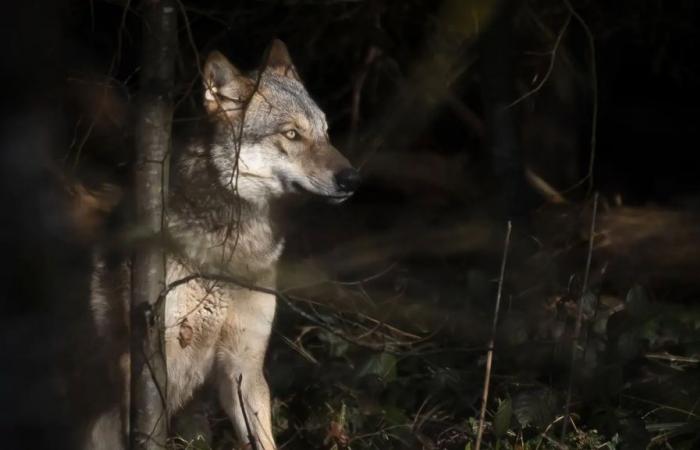M121 is currently the deadliest predator in Switzerland. Authorization to shoot him has already been given several times, but each time he escapes the fatal bullet.
Benjamin Rosch / ch media
The wolf called M121 even surprises David Gerke of the Swiss Wolf Group:
“I don’t know of any other wolf that is responsible for so much predation in such a short time.”
This year, 82 livestock were killed by the individual. Thus, one in eight attacks can be attributed to this wolf.
He was born in 2019 in the Marchairuz pack in the canton of Vaud. He then traveled through the Bernese Jura before returning to the Vaudois Plateau. Several times already, authorization to shoot it down has been given, but M121 has always escaped the rifle.
Image: Kora
The number of predations on livestock by this single wolf is remarkable. Especially since the general toll of damage caused by wolves in 2024 will probably be decreasing. 658 attacks in the cantons of Valais, Graubünden, Vaud and Glarus between the start of the year and the end of October. This represents a decline of just over 10% compared to the previous year.
This is despite the fact that the presence of wolves in Switzerland has increased significantly in recent years. These figures were published by various environmental organizations such as Pro Natura, WWF, Birdlife and the Swiss Loup Group, which referred to specialized cantonal services. There is now evidence of the presence of Switzerland’s largest predator in all cantons except Basel-City – and even there, not far from the Swiss border, in the district of Lörrach, a wolf has been identified through a camera trap.
Rush for wolf hunting licenses in Valais
According to nature conservation organizations, it is not clear whether the decline in numbers is linked to the preventive shooting of wolves carried out for the first time last winter. This would require case-by-case analyses, “preferably over several years,” explains Sarah Wehrli of Pro Natura. In the press release, we can read that this downward trend was evident from the summer of 2023, “therefore before the start of multiple shots last winter”.
Last year, conservation groups expressed concern that culling animals from a previously inconspicuous pack could lead to an increase in attacks because young animals cannot learn to hunt properly without their pack leader. 51 animals were slaughtered during the latest wolf culling campaign – but in the canton of Graubünden alone, more than 60 Cub Scouts were born the following spring.
In the meantime, the cantons concerned have resumed preventive shooting. In Valais, individuals are authorized to kill wolves. According to media reports, up to 1,300 people have registered for authorization. Since mid-September, Valais hunters and game wardens have already killed eight wolves, as cantonal statistics show.
In the canton of Graubünden, the order to cull a pack that is also in the Swiss national park is drawing criticism. The Fuorn pack is said to have killed two cattle near the park. A petition with 35,000 signatures opposes this felling decision, environmental organizations report. Despite constant criticism, both the latter and the National Park have renounced legal recourse.
Last week, an initiative to allow wolf shooting everywhere in Switzerland and all year round – with the exception of the national park – failed. The initiators, a group of seven individuals, had to admit that they had not reached the goal of collecting 100,000 signatures.
Another case shows that the wolf is a political subject taken seriously: within the Confederation, the position of head of the Wild Animals and Species Conservation section has been vacant for months. According to an investigation by Sunday viewAlbert Rösti’s department would have hired a headhunter this summer.
Translated and adapted from German by Léon Dietrich






